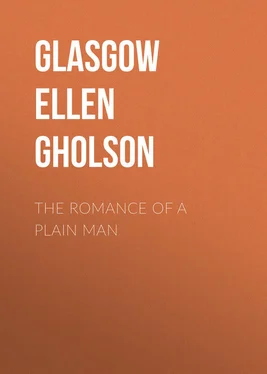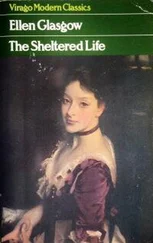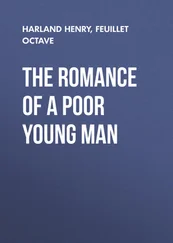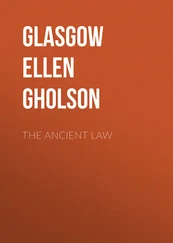Ellen Glasgow - The Romance of a Plain Man
Здесь есть возможность читать онлайн «Ellen Glasgow - The Romance of a Plain Man» — ознакомительный отрывок электронной книги совершенно бесплатно, а после прочтения отрывка купить полную версию. В некоторых случаях можно слушать аудио, скачать через торрент в формате fb2 и присутствует краткое содержание. Жанр: Технические науки, foreign_antique, foreign_prose, на английском языке. Описание произведения, (предисловие) а так же отзывы посетителей доступны на портале библиотеки ЛибКат.
- Название:The Romance of a Plain Man
- Автор:
- Жанр:
- Год:неизвестен
- ISBN:нет данных
- Рейтинг книги:4 / 5. Голосов: 1
-
Избранное:Добавить в избранное
- Отзывы:
-
Ваша оценка:
- 80
- 1
- 2
- 3
- 4
- 5
The Romance of a Plain Man: краткое содержание, описание и аннотация
Предлагаем к чтению аннотацию, описание, краткое содержание или предисловие (зависит от того, что написал сам автор книги «The Romance of a Plain Man»). Если вы не нашли необходимую информацию о книге — напишите в комментариях, мы постараемся отыскать её.
The Romance of a Plain Man — читать онлайн ознакомительный отрывок
Ниже представлен текст книги, разбитый по страницам. Система сохранения места последней прочитанной страницы, позволяет с удобством читать онлайн бесплатно книгу «The Romance of a Plain Man», без необходимости каждый раз заново искать на чём Вы остановились. Поставьте закладку, и сможете в любой момент перейти на страницу, на которой закончили чтение.
Интервал:
Закладка:
"Christ totes de young lambs in his bosom, bosom,
Christ totes de young lambs in his bosom, bosom,
Christ totes de young lambs in his bosom, bosom,
Fa-ther, de ye-ar-ur Ju-bi-le-e!"
Bob, the manager, picked up a leaf from the nearest trough, examined it carefully, and tossed it aside. The great black negro turned his head slowly toward him, the jagged scar standing out like a cord above the open collar of his red shirt.
"Christ leads de ole sheep by still watah, watah,
Christ leads de ole sheep by still watah, watah,
Christ leads de ole sheep by still watah, watah,
Fa-ther, de ye-ar-ur Ju-bi-le-e!"
"If I were to leave you here an hour what would you do, Ben?" asked the manager suddenly, speaking close to my ear.
I thought for a moment. "Learn to stem tobacco quick'en they do," I replied at last.
"What have you found out since you came in?"
"That you must strip the leaf off clean and throw it into the big trough that slides it downstairs somewhere."
A smile crossed his face. "If I give you a job it won't be much more than running up and down stairs with messages," he said; "that's what a nigger can't do." He hesitated an instant; "but that's the way I began," he added kindly, "under General Bolingbroke."
I looked up quickly, "And was it the way he began?"
"Oh, well, hardly. He belongs to one of the old families, you know. His father was a great planter and he started on top."
My crestfallen look must have moved his pity, I think, for he said as he turned away and we walked down the long room, "It ain't the start that makes the man, youngster, but the man that makes the start."
The doors swung together behind us, and we descended the dark staircase, with the piercing soprano voices fluting in our ears.
"Christ leads de ole sheep by still watah, watah,
Christ leads de ole sheep by still watah, watah."
That afternoon I went home, full of hope, to my attic in the Old Market quarter. Then as the weeks went on, and I took my place gradually as a small laborious worker in the buzzing hive of human industry, whatever romance had attached itself to the tobacco factory, scattered and vanished in the hard, dry atmosphere of the reality. My part was to run errands up and down the dark staircase for the manager of the leaf department, or to stand for hours on hot days in the stagnant air, amid the reeking smells of the big room, where the army of "stemmers" rocked ceaselessly back and forth to the sound of their savage music. In all those weary weeks I had passed General Bolingbroke but once, and by the blank look on his great perspiring face, I saw that my hero had forgotten utterly the incident of my existence. Yet as I turned on the curbing and looked after him, while he ploughed, wiping his forehead, up the long hill, under the leaves of mulberry and catalpa trees, I felt instinctively that my future triumphs would be in a measure the overthrow of the things for which he and his generation had stood. The manager's casual phrase "the old families," had bred in me a secret resentment, for I knew in my heart that the genial aristocracy, represented by the president of the Great South Midland and Atlantic Railroad, was in reality the enemy, and not the friend, of such as I.
The long, hot summer unfolded slowly while I trudged to the factory in the blinding mornings and back again to the Old Market at the suffocating hour of sunset. Over the doors of the negro hovels luxuriant gourd vines hung in festoons of large fan-shaped leaves, and above the high plank fences at the back, gaudy sunflowers nodded their heads to me as I went wearily by. The richer quarter of the city had blossomed into a fragrant bower, but I saw only the squalid surroundings of the Old Market, with its covered wagons, its overripe melons, its prowling dogs hunting in refuse heaps, and beyond this the crooked street, which led to the tobacco factory and then sagged slowly down to the river-bottom. Sometimes I would lean from my little window at night into the stifling atmosphere, where the humming of a mosquito, or the whirring of a moth, made the only noise, and think of the enchanted garden lying desolate and lovely under the soft shining of the stars. Were the ghosts moving up and down the terraces in the mazes of scented box, I wondered? Then the garden would fade far away from me into a cool, still distance, while I knelt with my head in my hands, panting for breath in the motionless air. Outside the shadow of the Old Market lay over all, stretching sombre and black to where I crouched, a lonely, half-naked child at my attic window. And so at last, bathed in sweat, I would fall asleep, to awaken at dawn when the covered wagons passed through the streets below, and the cry of "Wa-ter-mil-lion! Wa-ter-mil-lion!" rang in the silence. Then the sun would rise slowly, the day begin, and Mrs. Chitling's cheerful bustle would start anew. Tired, sleepless, despairing, I would set off to work at last, while the Great South Midland Railroad receded farther and farther into the dim province of inaccessible things.
After a long August day, when the factory had shut down while it was yet afternoon, I crept up to Church Hill, and looked again over the spiked wall into the enchanted garden. It was deserted and seemed very sad, I thought, for its only tenants appeared to be the swallows that flew, with short cries, in and out of the white columns. On the front door a large sign hung, reading "For Sale"; and turning away with a sinking heart, I went on to Mrs. Cudlip's in the hope of catching a glimpse of baby Jessy, whom I had not seen since I ran away. She was playing on the sidewalk, a pretty, golden-haired little girl, with the melting blue eyes of my father; and when she caught sight of me, she gave a gurgling cry and ran straight to me out of the arms of President, who, I saw to my surprise, was standing in the doorway of our old home. He was taller than my father now, with the same kind, sheepish face, and the awkward movements as of an overgrown boy.
"Wall, if it ain't Benjy!" he exclaimed, his slow wits paralysed by my unexpected appearance. "If it ain't Benjy!"
Turning aside he spat a wad of tobacco into the gutter, and then coming toward me, seized both my hands and wrung them in his big fists with a grip that hurt.
"You're comin' along now, ain't you, Benjy?" he inquired proudly.
"Tith my Pethedent," lisped baby Jessy at his knees, and he stooped from his great height and lifted her in his arms with the gentleness of a woman.
"What about an eddication, Benjy boy?" he asked over the golden curls.
"I can't get an education and work, too," I answered, "and I've got to work. How's pa?"
"He's taken an awful fondness to the bottle," replied President, with a sly wink, "an' if thar's a thing on earth that can fill a man's thoughts till it crowds out everything else in it, it's the bottle. But speakin' of an eddication, you see I never had one either, an' I tell you, when you don't have it, you miss it every blessed minute of yo' life. Whenever I see a man step on ahead of me in the race, I say to myself, 'Thar goes an eddication. It's the eddication in him that's a-movin' an' not the man.' You mark my words, Benjy, I've stood stock still an' seen 'em stridin' on that didn't have one bloomin' thing inside of 'em except an eddication."
"But how am I to get it, President?" I asked dolefully. "I've got to work."
"Get it out of books, Benjy. It's in 'em if you only have the patience to stick at 'em till you get it out. I never had on o'count of my eyes and my slowness, but you're young an' peart an' you don't get confused by the printed letters."
Diving into his bulging pockets, he took out a big leather purse, from which he extracted a dollar and handed it to me. "Let that go toward an eddication," he said, adding: "If you can get it out of books I'll send you a dollar toward it every week I live. That's a kind of starter, anyway, ain't it?"
Читать дальшеИнтервал:
Закладка:
Похожие книги на «The Romance of a Plain Man»
Представляем Вашему вниманию похожие книги на «The Romance of a Plain Man» списком для выбора. Мы отобрали схожую по названию и смыслу литературу в надежде предоставить читателям больше вариантов отыскать новые, интересные, ещё непрочитанные произведения.
Обсуждение, отзывы о книге «The Romance of a Plain Man» и просто собственные мнения читателей. Оставьте ваши комментарии, напишите, что Вы думаете о произведении, его смысле или главных героях. Укажите что конкретно понравилось, а что нет, и почему Вы так считаете.












